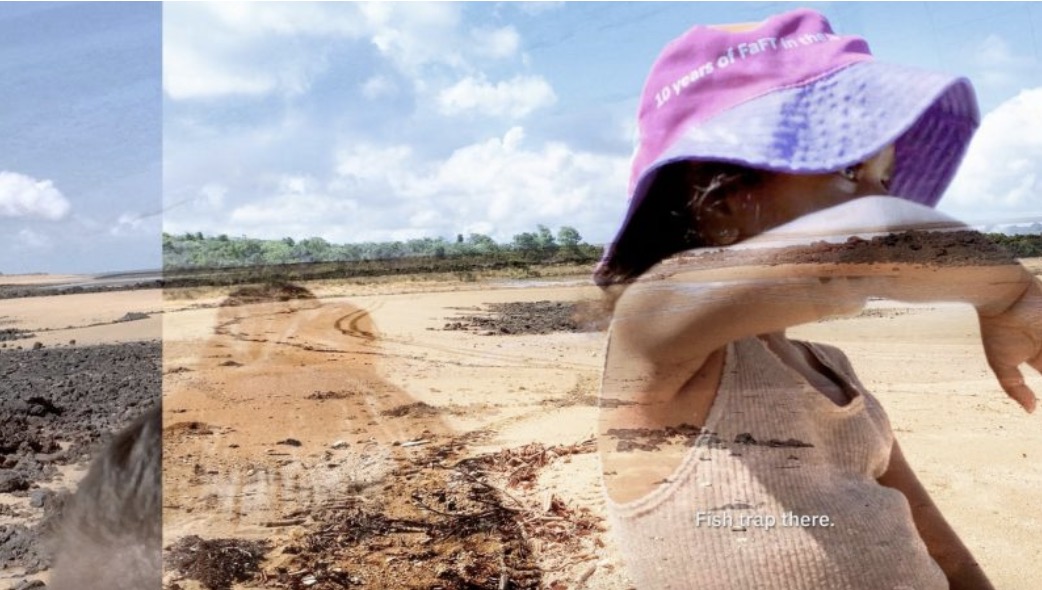
As a part of the 50th anniversary celebration of the Center for the Arts, the Ezra and Cecile Zilkha Gallery hosted a viewing of the Karrabing Collective’s latest film, “Night Fishing with Ancestors,” on Wednesday, Feb. 7. The collective, which is based in Australia, describes itself as “a grassroots indigenous filmmaking group,” for whom filmmaking provides an avenue for members to work through and share their lived experiences. The screening of the film was complemented by a conversation between one of the Karrabing Collective’s founding members, Franz Boas Professor of Anthropology and Gender Studies at Columbia University Elizabeth A. Povinelli, and Assistant Professor of Anthropology at Wesleyan University George Bajalia.
“Night Fishing” begins in darkness. The black screen is ultimately illuminated by a crackling fire before the film shifts to landscape shots. Sweeping aerial views pan over verdant greenery, while eye-level shots of coastal views—backdropped not by a musical soundtrack but by nature sounds such as the tweets and chirps of birds—lend the film a uniquely immersive quality.
The shoreline frames “Night Fishing” in both a literal and figurative sense. The coast is where most of the film’s scenes take place, and it is also a threshold which outsiders—usually serving as harbingers of destruction and ruin—cross to enter the community. The film reenacts a number of these encounters with outsiders. It begins with the arrival of the Macassans, who are depicted as relatively harmless, having come only to trade for the sea cucumbers that are abundant in the area; it ends with the encroachment of lithium mining onto indigenous lands, a practice that continues to this day, with Australia accounting for approximately 53% of the global lithium supply.
Povinelli plays key figures in the process of Australian colonization. While these colonizers are at times satirized so intensely—with their minimal dialogue exhibiting a single-minded, Scrooge-esque focus on profit above all other things—that they become darkly comical, the commemoration of the violence they catalyze (and its modern-day repercussions) always takes precedence. This is perhaps most clear in a drawn-out scene depicting the arrival of 18th-century explorer Captain James Cook. Employing intense distortions, the image and sound of the scene slows down to a degree that gives Povinelli as Cook a truly ghoulish quality.
One of the main focuses of “Night Fishing” is heritage—in particular, the importance of passing down one’s culture and history to future generations. This focus is inherent in every part of the film: Not only do the children involved with the collective play crucial parts in each of the re-enactments, but the film also seamlessly interweaves past and present through the scenery. Scenes play out on landscapes that one can imagine remaining the same through generations (due largely to hard-fought battles by the indigenous peoples who live on these lands). It is in this spirit of circularity that the film ends exactly how it started—with a fire, then darkness.
Following the film screening, Povinelli, prompted by questions from Bajalia, discussed the start of the Karrabing Collective, the process of creating a Karrabing film, and a notion she called the “ancestral present,” among other topics.
She began by describing the collective’s process of creating a film from conception to execution. Karrabing films, which Povinelli classed as their own genre, have no script, but rather emerge as depictions of common experiences among Karrabing’s members, she explained.
“People say what they want to,” Povinelli said. “This is how we shoot [a scene]: ‘Ok, on your marks, get set, go.’”
Many aspects of Karrabing films are characterized by this sort of spontaneity and ingenuity. For instance, Povinelli explained that, while the collective was camping in the remote area where the film takes place, the members suddenly decided to shoot a scene. Lacking any sort of costumes, she improvised by ripping up a bedsheet. The finished scene appears as-is in the film, complete with Povinelli’s bedsheet costume.
Another interesting aspect of the collective Povinelli highlighted is its reluctance to define itself as having a particular number of members, despite galleries frequently requesting this information as a part of the process of acquiring the collective’s films.
“It’s a way of refusing the in/out, the friend/enemy, this idea of an event that happened,” she explained.
This sort of flexibility allows the makeup of the collective to shift in whatever way is necessary to support its mission and the people involved.
Povinelli concluded with a discussion of the concept of the “ancestral present.” The notion of ancestry often deals exclusively with the past, but Povinelli questioned the validity of this idea.
“Everything you do is making you into the ancestor you will be,” she explained. “Everything you’re eating, touching is the ancestral present.”
For the Karrabing Collective, ancestry is not only about history, but also about how actions in the present will affect generations in the future. This ethos is embodied not just by “Night Fishing with Ancestors” but also by the collective’s goals as a whole.
The next event in the Ezra and Cecile Zilkha Gallery’s 50th anniversary celebration will occur on Tuesday, Feb. 27 and will feature a conversation between artist Carrie Yamoaka ’79 and Associate Professor of Art History and American Studies Claire Grace.
Anna Thomas can be reached at asthomas@wesleyan.edu.


Leave a Reply